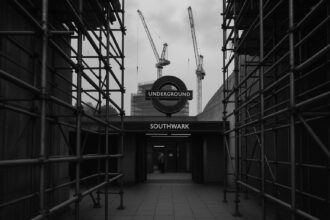The reintroduction of Operation Brock between junctions 8 and 9 on the M20 has sparked local anger over safety and congestion, with calls for alternative lorry stacking solutions and criticism of the new HGV permit system launching in July 2024.
Residents in Kent are expressing significant frustration with the reintroduction of Operation Brock, a traffic management scheme that has rendered the M20 motorway the “slowest” in the UK. The contraflow system, which alters the normal flow of traffic to create dedicated lanes for heavy goods vehicles (HGVs), is being implemented between junctions 8 and 9 during the Spring Bank Holiday and May half term, periods expected to see high volumes of traffic as holidaymakers and HGVs make their way to European ports.
According to National Highways, the M20 remains operational with the contraflow in effect, aimed at managing freight traffic bound for the Port of Dover and the Eurotunnel. While the authorities indicate that the system is necessary to facilitate a smoother transit for HGVs, many residents, including Tim Lindrup—a semi-retired coach driver from Aldington—have voiced concerns regarding safety. Lindrup, in correspondence shared with his MP, highlighted the perils of funneling all Dover-bound and London-bound traffic into one lane. His frustration is exacerbated by a belief that the Kent and Medway Resilience Forum (KMRF) has enacted these measures based on a mere anticipation of congestion rather than empirical evidence, stating, “I seriously cannot remember the last time I saw a lorry stacked in Operation Brock.”
Additional support for local grievances comes from Conservative MP Katie Lam, who referred to the situation as a “nightmare.” In her response to Lindrup, she noted that lorry backlogs along the M20 have plagued the area for years, and she has joined her fellow MPs in pressing the government for more effective traffic management solutions. Lam’s observations highlight a growing dissatisfaction among local representatives about the routine implementation of Operation Brock, which she asserts should involve careful consideration before deployment.
An essential aspect of Operation Brock is the newly introduced permit system for freight drivers, set to take effect on July 10, 2024. This permit will allow only those HGVs permitted to proceed and aims to streamline the flow of traffic into the Port of Dover. Such measures reflect ongoing attempts to reduce the potential for congestion, although there are added implications for drivers who may incur fines of up to £300 for non-compliance with traffic regulations.
Despite the government’s assurances that strategies are in place to manage traffic effectively, local communities remain sceptical about the efficacy of these measures. Residents have called for alternative solutions, such as utilising the nearby Sevington HGV lorry park for stacking lorries instead of obstructing one of the region’s key motorways.
Operational challenges highlight the delicate balance between facilitating trade and ensuring local safety and quality of life. As the government continues to work alongside various agencies to refine their traffic management plans, the ongoing dialogue between residents and lawmakers indicates an urgent need for practical and lasting solutions to the traffic disruptions that besiege this crucial transport corridor.
Ultimately, while Operation Brock may serve as a temporary measure to address freight traffic demands, the persistent dissatisfaction from the local populace serves as a reminder that effective traffic management must balance operational needs with the community’s well-being.
Source: Noah Wire Services
- https://www.express.co.uk/news/uk/2059158/fury-uk-slowest-motorway-returns – Please view link – unable to able to access data
- https://www.gov.uk/guidance/kent-traffic-management-on-m20-motorway-to-dover-and-eurotunnel – The UK government provides guidance on Operation Brock, a traffic management system designed to keep Kent’s roads open during disruptions at the Port of Dover or Eurotunnel. The system requires HGVs traveling to these ports to use designated routes, with enforcement officials deployed to intercept vehicles attempting to use alternative routes. Drivers caught violating the system face a £300 fine. The guidance also emphasizes the importance of driver welfare, advising drivers to plan their journeys to ensure adequate rest periods and to carry sufficient food and water in case of delays.
- https://trafficban.com/news.2023.html – An article discussing the introduction of a new permit system for freight drivers under Operation Brock, effective from July 10, 2024. The system aims to prevent hauliers from bypassing queues and to improve the flow of freight through Operation Brock, Dover TAP, and into the Port of Dover. Permits are issued to Port of Dover-bound freight drivers at the front of the Operation Brock queue. Drivers without a valid permit will be turned back to join the Brock queue. Non-compliance can result in on-the-spot £300 fines issued by Kent Police and the Driver Vehicle Standards Agency.
- https://nationalhighways.co.uk/article/m20-operation-brock-contraflow-to-be-deactivated-this-weekend/ – National Highways announces the deactivation of the Operation Brock contraflow system on the M20 in Kent, effective from August 19, 2023. The contraflow had been in place over a 13-mile section of the M20 between junctions 8 (Maidstone) and 9 (Ashford) during the summer period as a contingency measure due to expected high passenger numbers. The decision to deactivate the contraflow was made by Kent Resilience Forum partners, with the M20 reopening by 6am on Sunday, August 20, 2023.
- https://www.bbc.com/news/uk-england-kent-61681875 – BBC News reports on the lifting of Operation Brock traffic controls on the M20 in Kent after the Queen’s Platinum Jubilee celebrations. The Kent Resilience Forum had introduced the traffic-holding system in March to manage freight flow after P&O Ferries services were suspended. With the end of the half-term and Jubilee holidays, the system was deemed no longer necessary and was removed. The relocation of the contraflow barrier, which includes a 13-mile long drainage upgrade, will continue at least until early 2023, with a 50mph speed limit remaining in place on both carriageways during this period.
- https://nationalhighways.co.uk/article/operation-brock-contraflow-to-be-deployed-ahead-of-summer-holidays/ – National Highways announces the deployment of the Operation Brock contraflow system on the M20 in Kent ahead of the summer holidays and expected high passenger numbers. The contraflow system is part of measures to improve Kent’s resilience and ensure the smooth flow of traffic through the region in the event of disruption to services across the English Channel. The M20 will be closed overnight on July 11 and 13, 2023, to facilitate the safe deployment of the contraflow system, with fully signed diversion routes in place during these closures.
- https://news.kent.gov.uk/articles/operation-brock-does-the-job-as-a-million-passengers-travel-through-kent-to-europe – Kent County Council reports on the effectiveness of Operation Brock in managing the flow of over a million passengers traveling through Kent to Europe since the start of the summer holidays. The contraflow system, which was removed overnight on August 19, 2023, served to relieve congestion in Dover and at the A20 Roundhill Tunnels. The Kent Resilience Forum had been monitoring the situation and decided to remove the contraflow once outbound bookings diminished, returning the M20 carriageways to standard two-way traffic.













